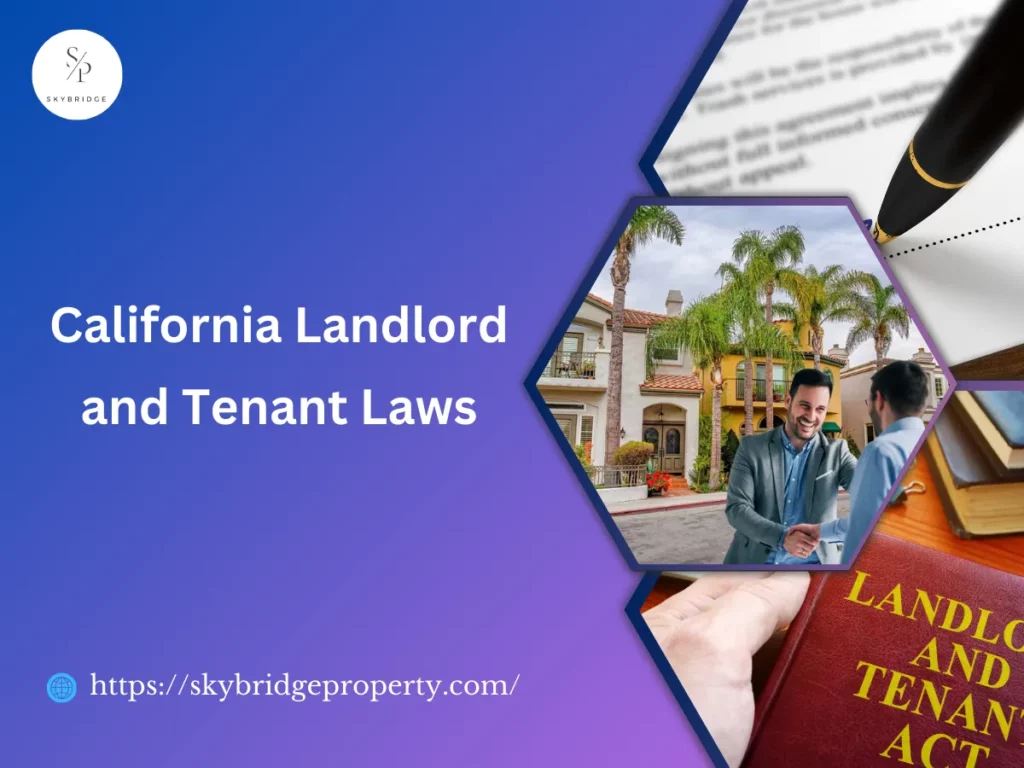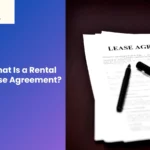California’s landlord-tenant laws exist to create a fair, safe, and transparent rental market for landlords and renters. The landlord laws and tenant laws balance the rights of landlords to protect their property and income with the rights of tenants to secure, habitable housing. Whether you own a rental property, manage apartments, or rent your home, having knowledge of landlord and tenant laws is critical. Ignorance or non compliant to the laws can lead to disputes, fines, or even lawsuits.
Landlords must know key areas like security deposit limits, eviction procedures, and rent control rules under laws such as Bill Text – AB 1482. Tenants, meanwhile, rely on these laws to ensure their right to a livable space, privacy, and protection from unfair rent hikes or retaliatory actions. Even property managers and real estate professionals need a firm grasp of these regulations to avoid legal pitfalls.
This guide breaks down California’s rental laws in plain language, covering everything from lease agreements and repair responsibilities to local rules in cities like Los Angeles and San Francisco. By staying informed, both landlords and tenants can protect their interests and foster trust in one of the nation’s most regulated and competitive housing markets.
Purpose of California Landlord-Tenant Laws
California’s landlord-tenant laws serve one main goal: to protect both property owners and renters while keeping the rental market fair and transparent. The landlord and tenant laws ensure landlords can manage their investments responsibly, while tenants get safe, stable housing without fear of sudden rent hikes, unsafe conditions, or unfair treatment.
A big focus is on habitability—the legal requirement that rental homes meet basic health and safety standards. For example, landlords must fix broken heaters, plumbing leaks, or pest infestations. Tenants, in return, must pay rent on time and avoid damaging the property. Laws like the Fair Housing Act also prevent discrimination during tenant screening, ensuring everyone has equal access to housing.
Another key purpose of landlord-tenant laws is balancing power. Rent control rules (like AB 1482) stop landlords from raising rents beyond reasonable limits, while eviction laws protect tenants from being removed without proper notice or justification. These rules also give tenants tools like the “repair and deduct” remedy if landlords ignore urgent maintenance issues.
By setting clear expectations, the landlord and tenant laws reduce conflicts and build trust. Whether you’re a first-time renter or a seasoned property owner, understanding these rules helps you avoid costly mistakes and legal headaches.
Governing Authorities of California Landlord-Tenant Laws
California’s rental laws are shaped by a mix of federal, state, and local authorities, each playing a unique role. At the federal level, laws like the Fair Housing Act (enforced by the U.S. Department of Housing and Urban Development, or HUD) ban discrimination based on race, religion, disability, and other protected categories. The federal rules set the baseline for fairness in housing nationwide.
State laws add another layer. California’s Civil Code (Sections 1940–1954) covers core issues like security deposits, eviction procedures, privacy protection, rent controls and habitability standards. Major statewide reforms like the Tenant Protection Act (AB 1482), which caps rent increases and restricts no-fault evictions. The California landlord-tenant laws prioritizes tenant stability. State agencies like the Department of Consumer Affairs provide guides and resources to help landlords and tenants understand their rights.
Local governments add the final piece. Cities like Los Angeles and San Francisco have their own rent control ordinances and eviction rules that go beyond state laws. For example, L.A. requires landlords to pay relocation fees for some no-fault evictions. Staying compliant to the California property management laws and regulations means knowing all three levels and ignoring local rules can lead to fines or lawsuits, even if you follow state and federal laws. It can be a hectic job to stay compliant with the federal, state, and local laws, however, a reputable property management company can help you stay compliant and avoid losses.
Landlords and Tenants Rights and Duties
California landlord and tenants rules ensure neither side holds all the power, landlords can protect their property, while tenants can enjoy safe and stable housing. California state law and local real estate laws have ordinances that protect the rights of both parties, the lessor and the lessee.
Landlord Rights and Duties
Landlord rights in California:
- Landlords have the right to collect rent timely from tenants.
- If not in a rent-controlled area, landlords can increase rent with proper notice.
- Can evict tenants for non-payment of rent, lease violations, or end of lease term which is subject to local just-cause eviction laws.
- Can enter for repairs, inspections, or emergencies with at least 24 hours’ notice except emergencies.
- Can request 1 month of up front rent as security deposit. However, small landlords, those who own no more than two residential properties with four or fewer units, are still allowed to charge up to two months’ rent for a security deposit.
- Can hold tenants accountable for lease violations.
- Can sell the property but must honor existing leases.
Landlords duties in California:
- Landlords should maintain habitable conditions for tenants which includes working plumbing, heating, electrical systems, weatherproofing, clean and safe common areas, pest control (if infestation is not due to tenant’s negligence), functional working doors and locks, etc.
- Repairs must be done on tenant’s request.
- Respect the tenant’s privacy, unless it’s an emergency the landlord should inform 24 hours prior to entering the rental unit.
- Landlords must follow the proper eviction process. The landlord can not force the tenant to vacate the property in any way as changing locks, shutting off utilities, or removing tenant belongings.
- Must return deposits within 21 days of move-out, with an itemized list of any deductions and bills.
- For Los Angeles landlords there is a new ordinance that mandates an interest rate at 4.32% if a tenant occupies the rental unit for more than a year.
- Comply with California Fair Housing Laws. Landlords can not discriminate or deny rental based on sex, race, religion, gender, income, disability, and other protected categories defined by Fair Housing Act and California Fair Employment and Housing Act.
Tenants Rights and Duties
Tenants rights in California:
- Right to a habitable home.
- Protection against illegal eviction.
- Right to privacy.
- Rent control & protection from unjustified rent increases
- Security deposit protections. Landlords must return security deposits within 21 days of move-out.
- Protection against discrimination and racism.
- Protection from retaliation, landlords cannot punish tenants for requesting repair, complaining to authorities, joining tenant’s union etc.
Tenants duties in California:
- Tenants must pay rent on time, in case of delay rental payment the landlord can take legal action eventually initiating the eviction process after a specified period.
- Keeping property clean and undamaged. Tenants will be responsible for minor repairs such as replacing light bulbs.
- Tenants must respect and follow lease contracts that could be no subleasing, no illegal activities, following pet policies.
- Allowing landlord access for repairs.
- Giving proper notice before moving out.
Rental Agreements in California
A rental agreement is a legal contract between a landlord and a tenant that lays out the terms and conditions for renting a property. In California, rental agreements can be month-to-month or fixed-term leases (such as a one-year lease). These agreements must follow state and local laws to protect both landlords and tenants.
A well-written rental agreement protects both landlords and tenants by setting clear expectations. Following California landlord-tenant law helps prevent disputes and ensures that both sides know their rights and responsibilities.
Creating a legally compliant California lease agreement is essential to protect both landlords and tenants. California’s landlord-tenant laws are strict and require specific disclosures and terms to ensure compliance.
Key Elements of a Rental Agreement:
- Identifying Parties: Include landlord and tenant details.
- Lease Duration: Specify whether it’s a fixed-term or month-to-month lease.
- Rent & Payment Terms: Outline rent amount, due dates, and late fees.
- Security Deposit: State the deposit amount and refund conditions.
- Maintenance Responsibilities: Define landlord and tenant obligations.
- Pet Policies: Include pet-related terms, fees, or restrictions.
- Early Termination: Explain penalties and re-rental responsibilities.
Required Disclosures:
Contact details, Megan’s Law notice, past deaths, bedbug history, asbestos, Proposition 65 warnings, toxic mold, flood risks, e-bike storage rules, and more.
Using compliant lease templates and legal services ensures clarity and adherence to California real estate laws and local ordinance. Consulting with lawyers could help you to stay compliant.
California rental application and tenant screening laws
California rental application and tenant screening laws regulate how landlords evaluate potential tenants while ensuring fairness and transparency. These laws prevent discrimination under the Fair Housing Act (FHA) and Fair Employment and Housing Act (FEHA) while setting rules on application fees, background checks, and tenant selection.
The California Civil Code § 1950.6 limits fees to cover screening costs, and landlords must provide Adverse Action Notices if rejecting an applicant. Tenants can report violations to the California Department of Fair Employment and Housing (DFEH). These regulations create a balanced process, protecting both tenants and property managers in rental housing transactions.
California Lease Agreement Laws
A lease agreement in California is a legally binding contract between landlords and tenants that outlines rental terms. Governed by California Civil Code Sections 1940–1954.05, these laws require leases to include basics like rent amount, security deposit details, and eviction rules. While oral agreements are valid for leases under one year, written contracts are strongly recommended for clarity.
Key requirements:
- Mandatory disclosures (e.g., mold, lead paint, bedbugs).
- Rent control rules (under AB 1482) for eligible units.
- Clear terms for lease termination (e.g., 30-day notice for month-to-month rentals).
California Security Deposit Laws
California strictly regulates security deposits to protect tenants from unfair charges while ensuring landlords can cover valid expenses. Under Civil Code § 1950.5:
- Deposit Limits:
- Small landlords (owner-occupied properties with ≤ 2 units): Up to 2 months’ rent (even if furnished).
- 1 month of rent as security deposit for furnished and unfurnished home.
- Permitted Deductions: Landlords can deduct for unpaid rent, damage beyond normal wear and tear (e.g., holes in walls), and cleaning costs to restore the unit to its original condition.
- Return Deadline: Deposits must be refunded with an itemized list of deductions within 21 days of move-out of the tenant.
California Rent Control Laws
California’s rent control laws limit how much landlords can raise rent and protect tenants from sudden, unaffordable hikes. These rules vary by city and are governed by state law (AB 1482) and stricter local ordinances. Here’s how they work:
Statewide Rent Control (AB 1482)
- Civil Code § 1947.12: The Tenant Protection Act of 2019 caps annual rent increases at 5% + inflation (measured by the Consumer Price Index) or 10%, whichever is lower. If inflation is 3%, the max increase is 8%.
- Covered Properties:
- Apartments and single-family homes are not exempt.
- Applies to units built ≥ 15 years ago.
- Exemptions:
- Newer buildings (≤ 15 years old).
- Single-family homes (unless owned by corporations/REITs).
- Owner-occupied duplexes.
Local Rent Control Ordinances
Many cities in California have stricter rules that override AB 1482 like Los Angeles, San Francisco, Oakland, Santa Monica, Berkeley, and San Jose.
- Los Angeles (Rent Stabilization Ordinance): Caps increases at 3–8% yearly for pre-1978 buildings.
- San Francisco (Rent Ordinance): Limits increase to ~1–3% annually for pre-1980 units.
- Oakland (Measure EE): Caps increases at CPI + 3% (max 10%) for most units.
- Other Cities: Santa Monica, Berkeley, and San Jose have unique formulas.
Things To Know
- Notice Periods:
- 30-day notice for rent hikes under 10%.
- 90-day notice for no-fault evictions (e.g., owner move-ins).
- Relocation Assistance: Cities like L.A. require payments (up to $22,500) for certain no-fault evictions.
- Penalties: Tenants can sue for refunds + attorney fees if landlords violate rent control laws.
California Notice of Entry Laws
California law balances a landlord’s right to access their property with a tenant’s right to privacy. Under Civil Code § 1954, landlords must provide advance notice before entering a rental unit, except in emergencies. Landlords who violate entry laws may face fines or lawsuits. Tenants can sue for invasion of privacy or request a restraining order. Here’s what both parties need to know:
When Can a Landlord Enter?
- Routine Repairs/Maintenance (24 hours prior in-written notice should be provided).
- Property Showings
- Emergencies (No notices needed e.g. fire, flood, gas leaks).
- Entry is allowed if the property is abandoned, could be unpaid rent and no tenant contact.
Rules for Entry
- Notice Must Be in Writing: Include date, time, and purpose of entry.
- Reasonable Hours: Typically 8 a.m.–5 p.m. unless the tenant agrees otherwise.
- Frequency: Landlords cannot enter excessively (e.g., daily inspections).
California Eviction and Lease Termination laws
Evictions must follow strict rules. Landlords can only evict tenants for valid reasons, such as unpaid rent, lease violations (like unauthorized subletting), or criminal activity. The process begins with a written notice—for example, a 3-day notice to pay or quit for unpaid rent. If the tenant doesn’t resolve the issue, landlords must file an unlawful detainer lawsuit in court. Retaliation, such as evicting a tenant for complaining about unsafe conditions, is illegal, as are “self-help” tactics like changing locks or shutting off utilities.
Lease Termination works differently for landlords and tenants. Tenants can legally end a lease early if the property becomes uninhabitable (e.g., no working heat) or for domestic violence (with a restraining order). Landlords, however, must have a “just cause” under state law (AB 1482), such as moving into the property or major renovations.
Notice Requirements for lease termination vary:
- Month-to-month tenants receive 30 days’ notice (60 days if they’ve lived there over a year).
- Fixed-term leases automatically expire unless renewed.
And, special protections exist for military tenants (who can terminate leases with deployment orders) and domestic violence survivors (who can request lock changes for safety).
Special Local Laws
California’s cities and counties often have unique rental rules that go beyond state laws. However, local laws vary widely, always check your city’s housing department website for updates. Violating these rules can lead to hefty fines or lawsuits. Here are key local regulations landlords and tenants should know:
Short-Term Rental Rules
Cities like Los Angeles and San Francisco restrict short-term rentals (e.g., Airbnb, VRBO):
- Los Angeles: Requires hosts to register with the city, limits rentals to 120 days/year (unless it’s the host’s primary home).
- San Francisco: Bans rentals of entire units unless the host lives there 275 days/year.
COVID-19 Eviction Protections
While statewide protections ended in 2023, some cities still shield tenants:
- Los Angeles: Tenants facing COVID-19 financial hardship can delay rent repayment until 2024.
- San Francisco: Evictions for unpaid pandemic-era rent (March 2020-June 2021) are barred.
Section 8 Protections
California bans discrimination against Section 8 voucher holders. In Los Angeles, landlords must accept vouchers unless exempt (e.g., owner-occupied duplexes).
Los Angeles Rent Stabilization Ordinance (RSO)
- Applies to buildings built before 1978.
- Caps annual rent increases (e.g., 3–4% in 2023).
- Requires relocation fees (up to $22,200) for no-fault evictions
San Francisco’s Eviction Controls
- Rent Ordinance: Allows evictions only for specific “just causes” (e.g., owner move-ins, capital improvements).
- Relocation Payments: Up to $25,000 per tenant for no-fault evictions.
Dispute Resolution in California
In California, landlords and tenants can resolve disputes through mediation, small claims court, or civil lawsuits, depending on the issue. Mediation (via local housing agencies or nonprofits) is often the first step, it’s faster, cheaper, and helps both sides negotiate solutions without lawyers. For example, disagreements over security deposit returns or minor repairs can be settled here.
If mediation fails, either party can file a case in small claims court (for claims under $12,500) or civil court. Tenants can sue landlords for habitability issues or illegal evictions, while landlords may pursue unpaid rent or property damage claims. The California Department of Fair Employment and Housing (DFEH) handles discrimination complaints, and local housing departments enforce rent control violations.
Free legal aid groups (like Legal Aid Foundation of Los Angeles) also help low-income renters navigate disputes. Always document issues and communicate in writing to strengthen your case.
How Skybridge Property Group Can Help With Landlord and Tenant Laws in Los Angeles?
As a local property manager in Los Angeles we are well aware and updated to local, state and federal landlord and tenant rules and compliances. We not only manage property in Los Angeles and nearby areas but also we help landlords to stay compliant with the California landlords-tenant laws:
- We work with legal professionals to ensure compliance with state and federal laws.
- We ensure that all lease agreements align with local rental laws.
- We enforce lease terms fairly preventing disputes over unclear clauses.
- We keep detailed records of all tenant interactions, notices, violations for legal protection.
- We help in negotiating solutions to avoid legal action, such as payment plans for overdue rent.
- We follow a proper legal process for eviction to avoid lawsuits.
- We educate tenants on their rights and responsibilities, rent deadlines, maintenance policies, and rule enforcement.







